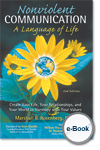Being Me, Loving You, continued
I’m going to ask you four questions related to your relationship to an intimate partner or spouse. If you want to focus on some other relationship, pick someone you’re close to, perhaps a good friend.
Write down your answer to each of the four questions below as though you were asked by this other person. Reader: We invite you to do this on your own on a sheet of paper.)
The first question: Would you tell me one thing that I do as your partner or friend that makes life less than wonderful for you?
You see, I don’t want to take any action or say anything that doesn’t enrich your life. So it would be a great service if, anytime I do something that isn’t enriching your life, you bring that to my attention. Could you think of one thing that I do - or don’t do - that makes life less than wonderful for you? Write down that one thing.
Now the second question. Not only do I want to know what I do that makes life less than wonderful for you, it’s also important for me to be able to connect with your feelings moment by moment. To be able to play the game of giving to each other from our hearts, your feelings are critical and I need to be aware of them. It’s stimulating when we can be in touch with each other’s feelings.
My second question then: Think of your answer to question number 1. When I do this thing, how do you feel? Write down how you feel.
Let’s move to the third question. I realize that how we feel is a result of our needs — when our needs are getting fulfilled, then we have feelings that fall under the heading of “pleasurable feelings,” like happy, satisfied, joyful, blissful, content . . . and when our needs are not being satisfied, we have the kind of feelings that you just wrote down.
So this is question three: What needs of yours are not getting met?
I’d like you to tell me why you feel the way you do in terms of your needs: “I feel as I do because I would have liked _____ (or because I was wanting, wishing, or hoping for ______.)” Write down what you need in this format.
Now I imagine you are excited because you want to get on to the final question, which is the center of life for all NVC speaking people.
Question four: I am aware that I am doing something that is not enriching your life and that you have certain feelings about that. You’ve told me what needs of yours are not getting fulfilled. Now, please tell me what I can do to enrich your life?
NVC is about clearly communicating those four things to other people at any given moment.
Of course, the situation is not always about our needs getting met. We also say “thank you” in NVC and tell people how they have truly enriched our lives by telling them the first three things. We tell them (1) what they’ve done to enrich us, (2) what our feelings are, and (3) what needs of ours have been fulfilled by their actions.
I believe that, as human beings, there are only two things that we are basically saying at any given time: “please” and “thank you.” The language of NVC is set up to make our “please” and “thank you” very clear so that people do not hear anything that gets in the way of our giving to each other from the heart.
Marshall Rosenberg, Ph.D., is the founder and director of educational services for the Center for Nonviolent Communication. He is the author of the international bestseller, Nonviolent Communication: A Language of Life and Speak Peace in a World of Conflict, and several other books and booklets.
Keep learning these vital communication skills with these books and training resources:



